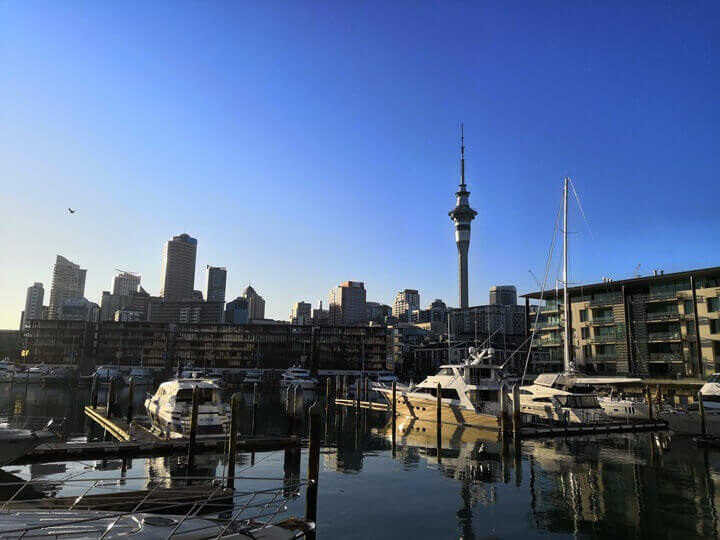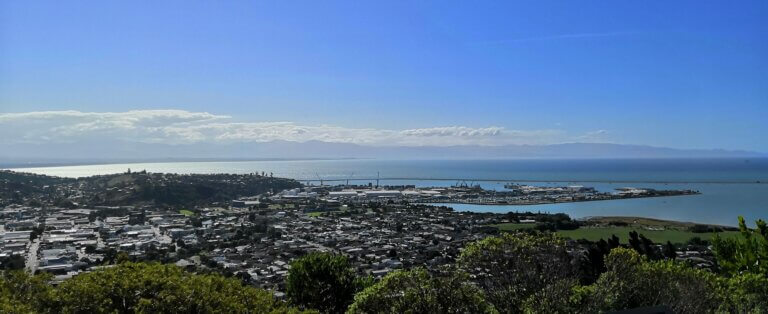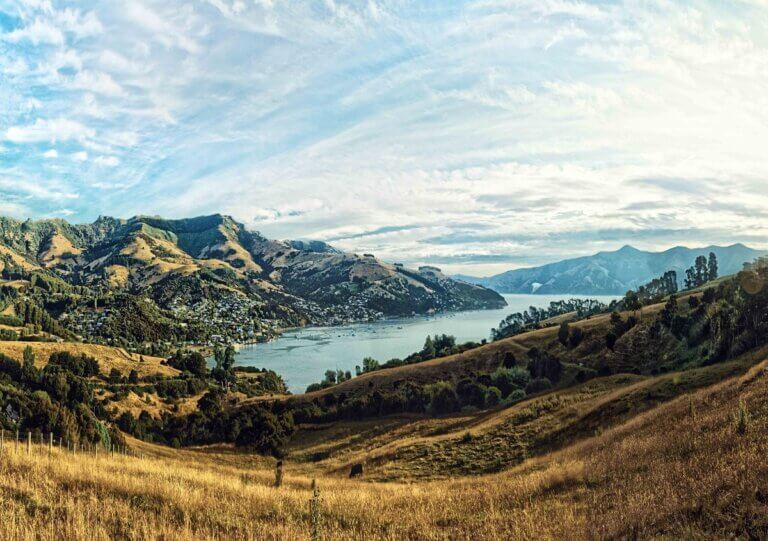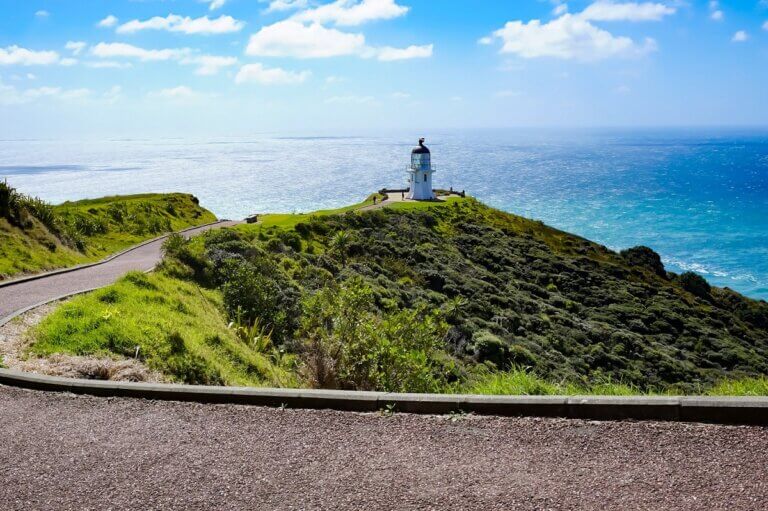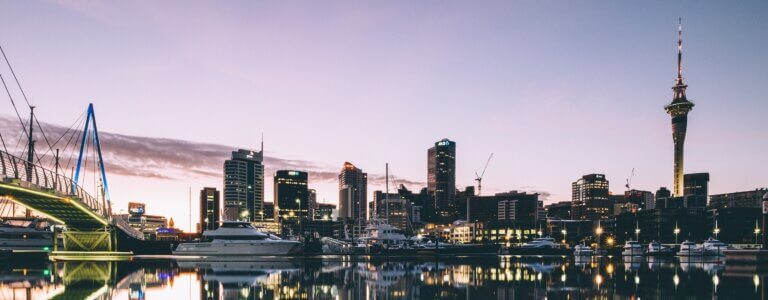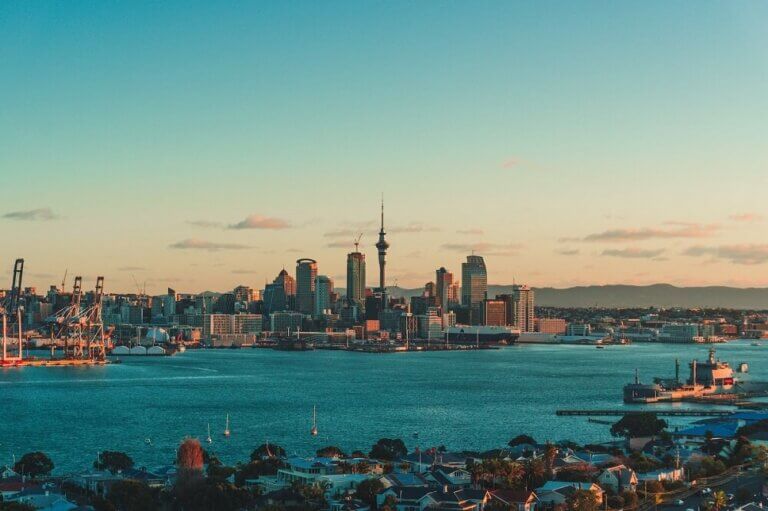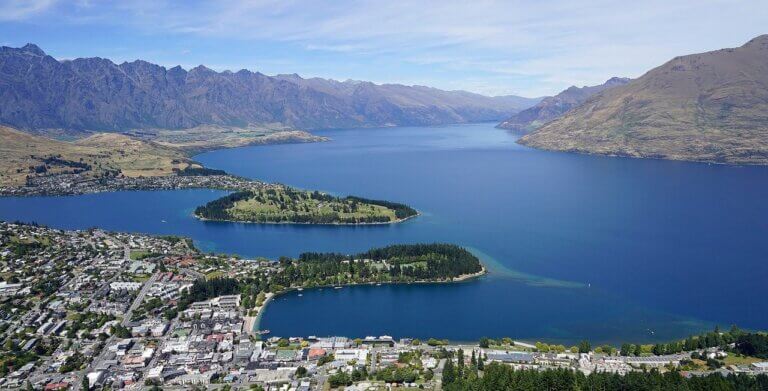Living in Auckland, New Zealand: a (Former) Local’s Guide
Wondering what living in Auckland is like? I spent eight years living in New Zealand’s largest city and want to share my take.
I moved to Auckland as a university student back in 2011. After graduating, I got a corporate job in marketing that allowed me to stay in New Zealand long-term until my move to the UK. As a result, I experienced the city at different life stages and price points.
Auckland often makes it into the lists of the top cities in the world to live in. While I agree that this city offers lifestyle opportunities that are hard to come by elsewhere, I also feel like these ratings sometimes ignore downsides that can massively affect your life, such as high cost of living.
This article looks at the upsides and drawbacks of this city to help you understand if living there is right for you.
Disclosure: Some of the links below are affiliate links, which means that at no additional cost to you, I may earn a small commission if you click through and make a purchase. Please note, I only recommend products and services that I know and love. Read full Privacy Policy here.
Living in Auckland: Pros
Auckland’s strengths lie in its stunning natural setting between the oceans. It is one of those rare large cities that combines an urban, multicultural environment with a laid-back lifestyle cantered around the beautiful outdoors.
Biggest City in New Zealand
Although some may view its size as a drawback, being the largest city in New Zealand has significant advantages, especially for those moving from abroad.
Firstly, Auckland offers the best career opportunities and salaries in the country. The city hosts offices of the largest local and major international companies, providing a wide range of professional pathways. With a population of 1.6 million, it’s also an ideal place to start your own business.
Also, thanks to its size, Auckland is the most well-connected city in New Zealand. Its international airport offers direct flights to Australia, the Pacific Islands, major destinations in Asia, US cities, and the Middle East, along with numerous domestic flights.
Lastly, as the largest city, Auckland boasts some of the best educational and healthcare facilities in the country. There are many educational providers to help you upskill at various stages of your life. Additionally, larger cities often offer more varied health services and medical professionals to address a broad range of health issues.
Relaxed Lifestyle and Laidback Culture
One common description of Auckland is that it’s a relaxed and laidback city, and I generally find this to be true. Kiwis are friendly, laidback, and value a relaxed lifestyle with plenty of outdoor time.
As a city, Auckland doesn’t feel as overwhelming as other major metropolises. It features a compact city centre known as the Central Business District (CBD) and sprawling suburbs. Although some areas are becoming denser, the city still predominantly consists of single-family dwellings with gardens. This creates almost a “small-town” feel, but on a big scale.
Many people report a good work-life balance, but in my experience, this isn’t always the case. Certain industries and professions may demand gruelling long hours, similar to other parts of the world.
For instance, my partner, who works in architecture, has faced hundreds of hours of unpaid overtime annually, including late nights and weekends at some companies. This, of course, limits time to enjoy what the country offers and may lead to burnout.
Ultimately, your individual work-life balance will largely depend on your profession and the company you work for. It’s important to research in advance to understand your potential employer’s culture and how work is structured as that will have a significant impact on the quality of your working life.
Easy Access to Beaches
One of the biggest advantages of living in Auckland is the easy access to numerous beaches. The city sits between the Tasman Sea and the South Pacific Ocean, each offering stretches of sand with distinctly different vibes.
On the west coast, along the Tasman side, you’ll find dramatic black-sand beaches such as Piha, Karekare, Te Henga (Bethells), and Muriwai. Although the waters can be cold and choppy, these beaches are excellent for surfing and enjoying the rugged scenery.
The beaches on the east coast, facing the Pacific, are generally calmer and perfect for swimming. Many suburbs, including Mission Bay, St Heliers, Takapuna, Devonport, and Browns Bay, boast their own beaches. However, be prepared to pay a premium to live in these areas.
Diverse and Multicultural
Auckland is a city of immigrants, and you can meet people from pretty much anywhere while living there. This also means that you can find exciting international food options and unique cultural events.
New Zealand’s biggest city boasts a large annual festival called Pasifika that celebrates the culture of the large Pacifica community that calls the city home. Auckland also hosts large Chinese New Year and Diwali celebrations.
However, for those who move to Auckland from overseas, its international population means that you can meet people from your home country which helps to smooth transition into a new city and culture.
Also, it can be challenging to make friends with locals who have established social networks from schools and universities. New residents are usually keener to build up their friendship circles. A constant flow of new people means that there are always new friends to be made.
Weather
Many people mistakenly believe that Auckland enjoys all-year-round sunshine and resembles a tropical paradise. While that’s not entirely true, the ‘City of Sails’ does boast a temperate climate with mild winters and warm, sunny summers.
In the southern hemisphere, the seasons are reversed, so summer in New Zealand occurs from December to February. During this period, Auckland typically experiences temperatures around 23°C (73°F), while winter temperatures average about 11°C (52°F).
Although extreme weather events like flooding do occur, they are relatively rare. However, with climate change, such events may become more frequent. Only time will tell.
The benefit of this climate is the ability to enjoy the outdoors all year round. Personally, I find it amazing not to worry about snow and the need for warm winter jackets.
Fantastic Food Scene
New Zealand is known for its high-quality meats, dairy, seafood, fresh produce, and wine. Many of Auckland’s restaurants have successfully combined these local ingredients with international flavours, creating a vibrant food scene.
From fine dining establishments like The Grove and Sidart, to trendy spots like Depot and Culprit, and a wealth of affordable Asian food outlets, the city offers something for every taste and budget. With a large Asian community, Auckland boasts numerous eateries showcasing various cuisines from the region.
One of my favourite food and drink experiences in Auckland is visiting local wineries. Take a ferry to Waiheke Island and savour your way through its many vineyards, many of which also feature on-site restaurants.
Proximity to Beautiful Nature
One of the greatest advantages about living in Auckland is that you can easily escape the city to enjoy some of North Island’s bucket list beauty spots. Whether you’re looking for a day trip or a weekend getaway, there are plenty of options to keep you busy.
My personal favourite place to visit from Auckland is the Coromandel Peninsula. With its stunning beaches, dramatic hills, lush forests, and quaint historic towns, it’s the perfect place to experience New Zealand’s laid-back spirit.
Other popular destinations from the city include the coastal city of Tauranga, the magnificent Waitomo Caves, and the Hobbiton village in Matamata. I was initially sceptical of the latter, expecting a tacky tourist trap, but a visit to the film set turned out to be a really enjoyable experience.
For more ideas on where to go, check out this guide to the best day trips from Auckland.
Relatively Safe
As far as big cities go, Auckland is relatively safe to live in. During my time there, I generally felt safe while out and about, even at night. Aside from a couple of intimidating encounters with homeless individuals, I didn’t experience any crime-related incidents.
That being said, like any city, Auckland does have crime, and there has been an increase since the pandemic. The most common crimes are burglary, theft, and harassment, although the homicide rate remains low.
It’s important to exercise the same level of caution in Auckland as you would in any other city. Keep an eye on your belongings, avoid unlit and deserted streets at night, and never leave your drinks unattended in bars.
The rise in crime is linked to growing inequality and social challenges that some communities face. While many of the more tragic statistics are confined to specific areas, petty crime can occur in any busy urban area.
Great Libraries
I know it might seem a bit random to mention this in the article, but one thing I miss about living in Auckland is its excellent libraries. Here in the UK, where I now live, libraries are struggling due to a lack of investment. However, I firmly believe in the value that libraries bring to a community.
The Central City Library in the heart of Auckland’s CBD boasts a great selection of books, magazines, and even community events for the whole family. You can get a library card for free and take advantage of both on-site and online resources. I still occasionally use my card to access online publications from there.
Some libraries are also worth a visit for their architecture. The cosy Devonport library is inspired by its seaside location, while Te Manawa (Westgate) and Takanini offer a modern community hub experience.
Living in Auckland: Cons
Just like any other city, living in Auckland has its drawbacks. The most significant challenges include a high cost of living, relatively modest wages, and geographical remoteness.
High Cost of Living
One of the primary challenges in Auckland is the high cost of living. While many items like groceries and clothing are pricier than in other parts of the world, housing remains the most significant expense for most people.
Despite substantial population growth over the last few decades, Auckland has not built enough housing. This shortage, combined with historically low interest rates, has led to rapidly increasing house prices.
Currently, the median house price in Auckland stands at NZ$1,025,000, equivalent to £494,200 or US$626,700. With no immediate solution in sight, potential homeowners should brace themselves for steep mortgage repayments.
The average weekly rent is NZ$624, which is about £300 or US$380. Monthly, this adds up to approximately NZ$2,700 (£1,300 or US$1,650). While this may not be the worst compared to other major cities, it is still a substantial cost.
Low Quality Housing
Housing in Auckland is not only expensive, but often of low quality as well. Some people have even described their homes as the best sheds they’ve ever lived in. To me, this is one of the biggest drawbacks of living in the city.
Many houses in Auckland lack insulation, only have single-glazed windows, and are constructed with the cheapest materials available. As a result, it is common for local homes to be cold, damp, and prone to mould, which can impact both your physical and mental health.
Although Auckland winters are mild, the poor insulation means you might still find yourself freezing inside your home. In the last property I lived in before leaving New Zealand, there was no ventilation in the bathroom, making it impossible to dry towels there due to constant dampness.
Thankfully, there is a way to mitigate this issue: choose new stock. New Zealand building code doesn’t aim high when it comes to build quality, but it’s still better than living in old properties that haven’t been modernised. Newer homes generally offer better insulation, which can significantly improve your living experience.
However, high-quality rental properties come at a premium. New build houses for sale are relatively scarce. You could purchase an older property and undertake improvements yourself, but this is not a cheap solution either.
Your Job Prospects May Be Limited
Despite being the largest city in New Zealand, Auckland’s job market is relatively small by global standards. As a result, you may find that your career opportunities are somewhat limited.
This is one of the reasons why many Kiwis move to nearby Australia or even further afield. Personally, as someone working in financial services communications, I found the UK to be a better fit in terms of the quantity and quality of opportunities available.
However, this is not the case for everyone. Many people find that they thrive professionally in Auckland. It really depends on your chosen industry and career path, so it’s important to do your research to understand the growth and salary prospects available to you.
Low Wages Relative to Cost of Living
The average salary in Auckland is NZ$74,000 (as of June 2024, Payscale), which is approximately £35,700 or US$45,200. While this may seem substantial, it doesn’t stretch far in Auckland.
With the median house price in Auckland at $1,025,000, it takes nearly 14 times the median salary to buy a home, making homeownership highly unaffordable. Generally, you would need dual incomes to purchase a property and maintain a comfortable lifestyle.
From personal experience, a single person would ideally need to earn at least $100,000 a year to enjoy a good lifestyle that includes going out, holidays and savings. Earning below the median salary might make it challenging even to afford your own place.
For families, a combined household income of at least $160,000 is necessary, ideally more. Young families face particular challenges as New Zealand has some of the highest childcare costs in the world.
Housing isn’t the only costly aspect of living in Auckland. Expenses like groceries, clothing, entertainment, and travel also significantly impact your budget.
Nevertheless, it is entirely possible to earn a great salary in Auckland, which can allow you to enjoy the best aspects of local life. However, it’s crucial to do thorough research before moving to understand what you can expect to earn and how much your desired lifestyle will cost.
Weather
Wait, wasn’t the weather a pro? While the comfortable temperatures and sunny summer days are definitely a highlight of living in Auckland, you should also be prepared for a lot of rain.
Auckland experiences rainy winters that can sometimes feel quite dreary. Expect nearly half of the winter days to be rainy.
Interestingly, Auckland receives more rainfall than London, a city often associated with endless rain. To put it into perspective, Auckland gets an average of 1,210mm of rainfall annually, compared to London’s 605mm. Additionally, while London sees 112 rainy days per year, Auckland has about 136.
I’ve known some Kiwis who moved to Brisbane and the Gold Coast in Australia in search of more consistent sunshine and warmth. In other words, if you’re dreaming of an endless summer, Auckland might not be the perfect fit.
Patchy Public Transport Network
One aspect of urban life where Auckland has faced challenges is its public transport system. As previously mentioned, the city has a small Central Business District (CBD) surrounded by sprawling suburbs that cover a large area, not all of which are well-connected.
Buses are the main form of public transport in Auckland. During my time living in various parts of the city, I relied heavily on buses, which was often a frustrating experience during rush hour. Buses would become packed and slow due to congestion.
There is also a small train network. If you live near a train station, commuting to the city is relatively straightforward. However, the network’s coverage is not extensive. For instance, suburbs on the North Shore have no train service at all.
A few suburbs benefit from ferry connections, which undoubtedly provide the most picturesque commute. However, these services can be quite limited in some areas.
If you live in central suburbs like Mount Eden, Mission Bay, or Ponsonby, public transport is generally reliable. However, the further out you go, the more challenges you may encounter.
High Reliance on Cars
Issues with public transport have led to another downside of living in Auckland: car reliance. The limited public transport options mean that many residents need their own vehicle for day-to-day activities.
As the city’s population grows, more cars are added to the roads, exacerbating traffic congestion. While Auckland has been investing in expanding its public transport network, progress has been slow.
I lived in central Auckland for a long time without a car, and overall, it was manageable since my work was centrally located. Grocery delivery services further minimised my need for a car.
However, not having a car means you might miss out on exploring all the natural beauty Auckland has to offer. For example, good luck getting to the West Coast beaches like Muriwai by public transport.
All in all, if you plan to stay in Auckland for a while, I recommend getting a car relatively early on to ensure you have access to everything the city and its surroundings offer.
Limited Shopping Choices
Although shopping options in Auckland are constantly improving, you might find the variety of products—from supermarket items to fashion and furniture—somewhat limited compared to other parts of the world.
This is largely due to New Zealand’s relatively small population and geographical remoteness. Personally, this was never a major issue for me, but it can be frustrating if you’re accustomed to more extensive choices.
However, the situation is getting better. New retailers and brands are continuously entering the market. For instance, Ikea is set to finally open its doors in 2025.
Online shopping offers another solution, though you should be mindful of potential extra costs from international shipping. If you can afford to travel for shopping, Sydney is a fantastic ‘nearby’ destination with a wide range of options.
Modest Nightlife
By international standards, Auckland’s nightlife is relatively tame. The majority of pubs and clubs are concentrated in central Auckland, particularly around the Viaduct, Ponsonby, and K’Road.
The CBD offers the most diverse selection of nightlife options, ranging from budget-friendly backpacker spots to tiki bars and popular nightclubs. K’Road is known for its alternative scene and serves as the epicentre of queer nightlife. If you’re looking for upscale wine and champagne bars, Ponsonby is the place to go.
Personally, since my interest in nightlife is quite limited, this was never a concern for me. However, if you’re a big night owl, you might find the options in Auckland somewhat limited.
Small Arts and Culture Scene
If you are used to spending your weekends attending theatre performances, visiting art galleries, and exploring museums, you might find Auckland’s offerings limited. The city has only one major art gallery and a handful of museums and theatres.
To be frank, though, Auckland has more than enough of arts and culture for an average person. After all, most people go to the theatre and attend some exhibitions at museums and art galleries a few times a year at best.
The city frequently hosts tours of major international musicals and is home to the Auckland Theatre Company and New Zealand Opera. The annual Auckland Arts Festival is also a highlight of the cultural calendar, offering a chance to experience exciting theatre, fine art, dance, and music from New Zealand and around the world.
You can also find local grassroots theatre productions at venues like Basement and Q Theatre. Moreover, Auckland Art Gallery regularly features international exhibitions showcasing famous artists.
So, although Auckland may not rival global cultural hubs like London or New York, it still offers plenty of fun cultural activities that will satisfy most people’s cultural cravings.
Far Away from the Rest of the World
This might not be an issue for everyone, but there’s no denying that Auckland is remote. Surrounded by oceans, it takes a few hours to reach its closest neighbours like Australia and Pacific Islands such as New Caledonia or Fiji.
Traveling further to Asia, Europe, or North America takes much longer and can also be expensive. Many expats I’ve known were unable to afford frequent trips back home, which can be a significant drawback.
Unless you are earning a substantial salary, you might find it challenging to visit friends and family in your home country as often as you would like. This very reason does prompt some to leave New Zealand altogether.
Personally, I didn’t struggle much with Auckland’s remoteness during my initial years there. However, as time passed and my priorities shifted, the geographic isolation became more of a concern for me.
For some, the distance is not a problem. After all, being so far away from everywhere makes it feel like you are removed from the troubles of this world. As the saying goes, to each their own.
Best Areas to Live in Auckland
Auckland has many excellent areas to live in that cater to different preferences and stages of life. It’s impossible to cover all great options, so I’m going to share my favourite spots to live in the city.
Ponsonby
Located just to the west of Auckland CBD, Ponsonby is an affluent suburb popular with young professionals for its dining options, nightlife and easy connectivity to the city through local buses.
Ponsonby boasts some beautiful historic housing stock in the form of timber Victorian villas. Although they are easy on the eye, many of them are cold, damp and draughty as they haven’t been modernised.
This suburb is pricy, but it’s a great place to live if you enjoy going out and work in the CBD. The downside is that you do need to make an effort to get to the beautiful natural spots as there are not that many in the immediate area.
Mount Eden
This is the area I lived in just before I left Auckland, and I’d be happy to return. Named after the eponymous volcanic cone that towers over the suburb, it features quaint character homes, good schools and a charming village centre with independent shops and cafes.
It’s conveniently located a short bus ride from the CBD and offers easy access to parks such as Mount Eden and nearby One Tree Hill. I particularly loved the proximity to Dominion Road, where you can find an independent cinema and a wealth of affordable Asian eateries.
While there are no beaches in the area, the predominance of houses rather than apartments makes it easy to keep a car, allowing for easy trips to the beach whenever desired.
Takapuna
Located on the North Shore, Takapuna boasts a beautiful beach and excellent amenities, including a small mall, along with a variety of cafes and restaurants.
Compared to other areas on this list, Takapuna features a more modern housing stock, offering both houses and apartments to suit various preferences and budgets.
Although the North Shore isn’t very well-connected overall, Takapuna’s proximity to the CBD makes commuting by bus relatively manageable.
Tips for Relocating to Auckland
Here are a few tips on how to make your transition to living in Auckland successful:
Research thoroughly: I can’t stress this enough. While marketing materials are great, you need to understand the kind of job opportunities available, your potential earnings, and the lifestyle your income can support. The internet is a valuable resource, offering a wealth of information right at your fingertips.
Visit before you move: If possible, visit Auckland before committing to a big move. Explore potential neighbourhoods to live in and gauge the practicalities of daily life in the city. This is also a great way to see if Auckland’s vibe matches what you’re looking for.
Engage socially: Once you arrive, join local social groups through platforms like Meetup.com to meet new people. Building friendships will significantly ease your transition. Don’t hesitate to explore new hobbies and sports too, as these activities can lead to wonderful social opportunities.
Try before you buy: If you’re considering buying property in Auckland, rent in your preferred area first. While internet research is helpful, experiencing an area firsthand is crucial before making any significant financial commitments.
Final Thoughts
I hope you’ve found this guide to living in Auckland helpful. Ultimately, every place in the world has its pros and cons. It’s important to weigh which advantages matter most to you and which drawbacks you can comfortably tolerate.
Whether you’re planning to relocate to Auckland permanently or just stay for a short period, I’m confident that you’ll have an unforgettable experience.
If you’re curious about what else you can explore while living in New Zealand, be sure to check out these guides to the best things to do on the North and South Islands.
For insights into other New Zealand cities, take a look at these articles on Wellington, Nelson, and Queenstown.
FAQs: Living in Auckland
For a single person, a good salary which would allow for a comfortable lifestyle is about NZ$100,000 a year. You should be able to get your own place, enjoy socialising, go on holiday and save. If you are supporting a family, you will need significantly more. I’d aim for at least $160,000 a year in this case.
Auckland attracts people with its laid-back lifestyle and natural beauty. You are never too far away from a beach or a great hike when you’re living in Auckland. Also, it offers the best work opportunities within New Zealand.
There are a few affluent suburbs in Auckland that can be described as ‘posh’. They include Parnell, Herne Bay, St Mary’s Bay, Ponsonby, Remuera, Epsom and St Heliers. They are all great to live in, but of course command a premium.
Yes, overall Auckland is a friendly city with easy-going locals. However, it will take time to get through the polite friendliness and forge meaningful relationships with them.
Enjoyed this guide to living in Auckland, New Zealand? Bookmark or pin it for later.
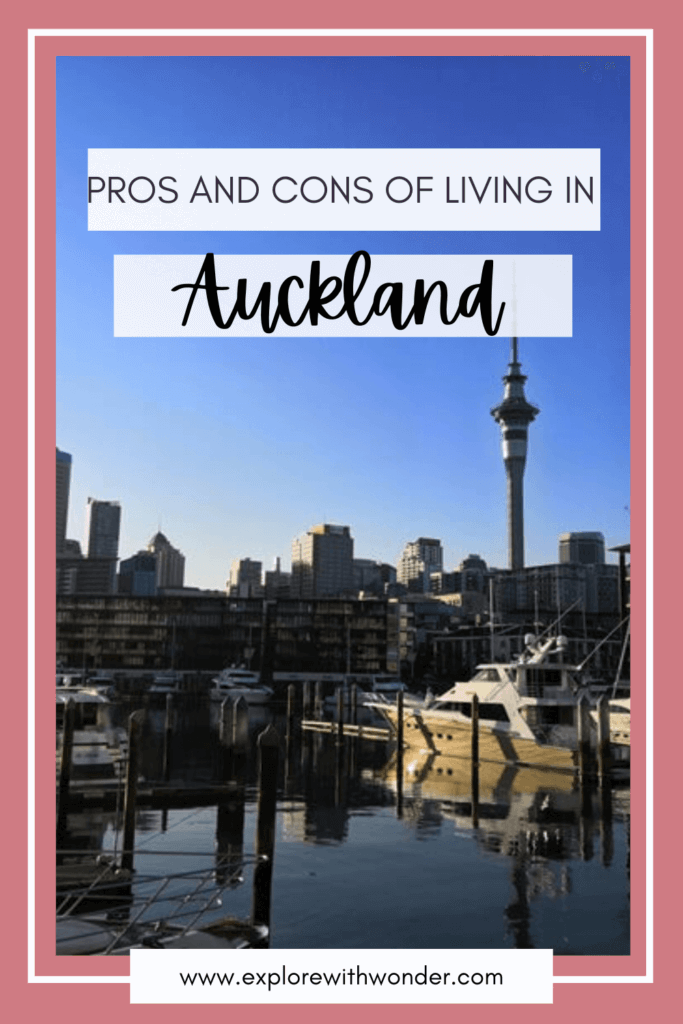
Related Reads: New Zealand
- The 14 Best Things to Do in New Zealand’s North Island
- The 18 Best Things to Do in New Zealand’s South Island
- Auckland Travel Guide: Top Things to See and Do
- The 11 Best Day Trips from Auckland
- Where to Stay in Auckland for One Night Pre-Cruise
- Top Things to See and Do in Wellington
- Top 10 Things to Do in Nelson
- Is Akaroa Worth Visiting? 8 Reasons to Visit Akaroa, New Zealand
- Where to Stay in Akaroa: The Best B&Bs, Motels and Holiday Homes
- The 21 Best Things to Do in Queenstown

